|
|
| |
|
| |

Hexagon
Series on
Human, Environmental Security and Peace (HESP)
Edited by
Hans Günter Brauch,
AFES-PRESS, chairman
Free University of Berlin (Ret.)
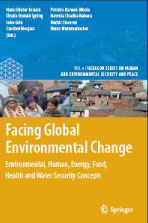 |
Vol 4 |
Hans Günter Brauch, Úrsula Oswald Spring, John Grin, Czeslaw Mesjasz, Patricia Kameri-Mbote, Navnita Chadha Behera, Béchir Chourou, Heinz Krummenacher (Eds.): Facing Global Environmental Change: Environmental, Human, Energy, Food, Health and Water Security Concepts. Hexagon Series on Human and Environmental Security and Peace, vol. 4 ( Berlin – Heidelberg – New York: Springer-Verlag, 2009).
With 249 Figures, 135 Tables and 27 Boxes
ISBN : 978-3-540-68487-9 (book)
e-ISBN : 978-3-540-68488-6
DOI : 10.1007/978-3-540-68488-6
Book Announcements and Online Bookstores
Book Presentations and Press Conferences
Book Reviews
Book Aid Project on this Book
|
Content
Editors
Forewords
Prefaces
Authors (biographies)
Publisher
Reviewers
|
This policy-focused, global and multidisciplinary security handbook on Facing Global Environmental Change addresses new security threats of the 21st century posed by climate change, desertification, water stress, population growth and urbanization. These security dangers and concerns lead to migration, crises and conflicts. They are on the agenda of the UN, OECD, OSCE, NATO and EU. In 100 chapters, 132 authors from 49 countries analyze the global debate on environmental, human and gender, energy, food, livelihood, health and water security concepts and policy problems. In 10 parts they discuss the context and the securitization of global environmental change and of extreme natural and societal outcomes. They suggest a new research programme to move from knowledge to action, from reactive to proactive policies and to explore the opportunities of environ-mental cooperation for a new peace policy.
Forewords by R.K. Pachauri, Chairman, IPCC; Achim Steiner, Exec. Director, UNEP; Joy Ogwu, former Foreign Minister of Nigeria; Stavros Dimas, EU Commissioner for Environment.
With Prefaces by Luc Gnacadja, Executive Secretary, UNCCD Secretariat; Sálvano Briceño, Director, Secretariat of the International Strategy for Disaster Reduction; Michael Zammit Cutajar, former Secretary General, Secretariat of the UN Framework Convention on Climate Change; Vandana Shiva, Alternative Nobel Prize
Contents : Forewords.- Prefaces.- Part I Contextualization of Gobal Environmental Change.- Part II Securitization of Global Environmental Change.- Part III Securitization of Extreme Natural and Societal Outcomes.- Part IV Energy Security for the 21st Century.- Part V Food Security for the 21st Century.- Part VI Livelihood and Health Security for the 21st Century.- Part VII Water Security for the 21st Century.- Part VIII Environmental Security Concepts and Debates.- Part IX Human and Gender Security Concepts and Debates.- Part X Conclusions : From Knowledge to Action and Policy Outlook.- Abbreviations.- Bibliography.- Biographies and Contributors.- Index
All chapters were anonymously peer reviewed. |
| |
|
|
|
 |
Hans Günter Brauch, PD ( Adj. Prof. ) at the Free University of Berlin, chairman of AFES-PRESS, fellow at UNU-EHS in Bonn and editor of this series; he publishes on security and environment issues.
Úrsula Oswald Spring, Professor at National University, Mexico; UNU-EHS chair on social vulnerability; she writes on sustainability, development, gender, disaster, poverty and collaborates with peasants.
|
 |
| |
|
|
 |
John Grin , Professor, Director of the Amsterdam School for Social science Research; publishes on societal transformations in water management, agriculture and health care, and advices practitioners.
Czeslaw Mesjasz , Assoc. Professor, Vice Dean, Management, Cracow University of Economics; publishes on systems and game theory, conflict resolution, negotiation, economics, finance and security. |
 |
| |
|
|
 |
Patricia Kameri-Mbote, Associate Professor, School of Law, University of Nairobi, Chair, Department of Private Law and Programme Director, International Environmental Law Research Centre, Nairobi.
Navnita Chadha Behera (New Delhi), Professor at the Nelson Mandela Centre for Peace and Conflict Resolution, Jamia Millia Islamia; she publishes on Kashmir and other South Asian security issues. |
 |
| |
|
|
 |
Béchir Chourou teaches International Relations at the University of Tunis-Carthage in Tunisia and publishes on Euro-Mediterranean relations, food policy and human security in the Arab world.
Heinz Krummenacher , Managing Director of swisspeace, heads its early warning unit FAST International and is a member of the UN staff college’s Early Warning Preventive Measures training unit. |
 |
| |
|
|
|
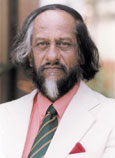 |
R. K. Pachauri
Director General, TERI, New Delhi
Chairman, IPCC
Peace Nobel Laureate, 2007 |
This book serves an extremely useful purpose, because it covers several critical elements of climate change and the challenges that are thrown up by consideration of the impacts of climate change and security issues related to it. Such a volume is not only highly readable for a very wide audience, but also contains valuable information and research based analysis that would provide a valuable reservoir of knowledge to researchers and students working in this field.
|
| |
|
|
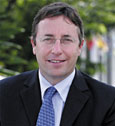 |
Achim Steiner
UN Under-Secretary General and
Executive Director,
UN Environment Programme (UNEP) |
So I welcome this Security Handbook for the Anthropecene – Facing Global Environmental Change : Environmental, Human, Energy, Food, Health and Water Security Concepts and its 100 peer-reviewed chapters as an eye-opener to both the challenges but also the opportunities of our age. I hope that private foundations and donors can ensure that its important ideas, debates and essential reading find their way equally onto the library book shelves of the South as well as the nations of the North.
|
| |
|
|
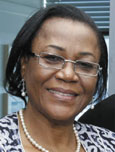 |
Ambassador Prof. Dr. Joy Ogwu
Permanent Repre-sentative of the Federal Republic of Nigeria to the United Nations
New York, NY
|
This book deserves many readers in all parts of the world, but especially in those countries where university and research libraries are unable to afford such references books. It is my sincere hope that this high-quality and multidisciplinary study and reference book and its key messages will be made available with the support of private foundations and public donors to the young generation in the global South that will face these challenges to their security in the 21 st century. I wish the book-aid project success for the benefit of university libraries and research institutes and their readers in Africa, Asia and Latin America.
|
| |
|
|
 |
Stavros Dimas
Commissioner for the Environment of the European Union
Since 2004 |
The title of this volume – Facing Global Environmental Change : Environmental, Human, Energy, Food, Health and Water Security Concepts – sums up many of the dilemmas and challenges facing policy-makers today. ….
“Since the end of the Cold War, the security debate has changed fundamentally. A study which addresses the new challenges and suggests responses will therefore be a welcome addition to the policy-maker’s toolkit. For this reason, I warmly welcome this volume.” |
| |
|
|
|
 |
Luc Gnacadja
Executive Secretary, UNCCD Secretariat
|
For land degradation and desertification, its huge economic and social costs, and ultimately, implications for peace and security, have not been given adequate recognition. …
In terms of its global reach, the drylands include approximately one third of the Earth’s surface and more than one hundred countries. Over 250 million people are directly affected by desertification, while one billion are at risk. …
An integrated approach to tackling desertifi-cation and climate change will have multiple benefits, especially for the poor in the world’s drylands, who are suffering most from the double blow of desertification and climate change. |
| |
|
|
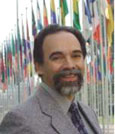 |
Sálvano Briceño
Director, Secretariat of the International Strategy for
Disaster Reduction
|
On the issue of environmental security, migration and disasters resulting from increased vulnerability, like so many global challenges, my duty as Director of the United Nations International Strategy for Disaster Reduction (UN/ISDR) is to ensure that those countries experiencing disasters due to vulnerability to natural hazards, particularly in the developing world, find their voice, and that their voice is heard.
|
| |
|
|
 |
Michael Zammit Cutajar,
former Secretary General, Secretariat of the UN Framework Convention on Climate Change
. |
Climate change is an unequivocal fact. Human activity has been destabilizing the global climate. The resulting changes, mostly negative in their impacts on society and on ecology, are taking place faster than expected. There is an urgent need for action to contain this trend over the next two or three decades if it is to remain within manageable limits this century. Even within those limits, societies everywhere will have to take stock of the expected changes and adapt to them. |
| |
|
|
 |
Vandana Shiva
Physicist, ecofeminist, environmental activist,
She received the Alternative Nobel Prize (1993) “for placing women and ecology at the heart of modern development discourse”
|
The global reach of corporations to take over the resources of the poor of the Third World is made possible not just by reduction and removal of tariffs, one of the goals of the WTO. It is facilitated by the removal of ethical and ecological limits on what can be owned as private property and what can be traded. The WTO’s overall goal of promo-ting ‘market competition’ serves two functions. Firstly, it transforms all aspects of life into commo-dities for sale. Culture, biodiversity, food, water, livelihoods, needs and rights are all transformed and reduced to markets. In this way, globalization is completing the project of colonization that led to the conquest and ownership of land and territory. Biological resources and water, the very basis of life’s processes, are being colonized, privatized, and commoditized.
|
| |
|
|
More on this book
|
Publisher's Corner
|
Author’s Corner
|
This fourth volume of the Hexagon Book Series on
Human, Environmental Security and Peace: HESP
was made possible by a research grant
for AFES-PRESS funded by the

|
|
|